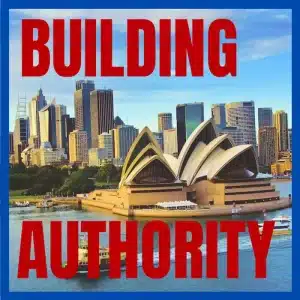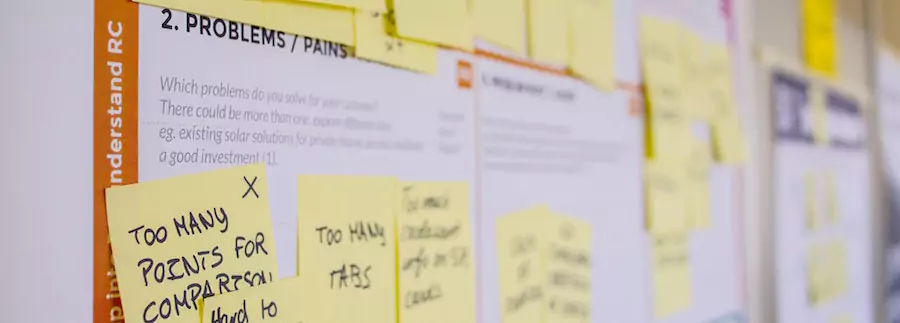
Project management challenges
Despite the best planning in the world, there are always going to be project management challenges. Typically, these include:
- Not meeting deadlines
- Unclear goals and objectives
- Team issues
- Communication challenges
- Technical problems
- Scope creep
- Risks to manage and avoid
If you believe Murphy’s Law: Anything that can go wrong will go wrong. (Wikipedia)
Overcoming your Obstacles
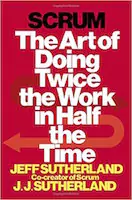
One of the basic problems for any project is the limitation of the planning process itself.
Jeff Sutherland is one of the co-founders of the Scrum movement and author of the book Scrum: The Art of Doing Twice the Work in Half the Time. (I created a book summary of this book over at Book Rapper as Great Work)
In Scrum, Sutherland talks about the problems using Gantt Charts which attempt to map out all of the tasks involved in a project in sequential order. Sutherland has a particularly dislike for Gantt Charts – mainly because most of his work over the years has been to fix things when they go wrong. That was the thorn in his shoe that inspired Scrum.
Following on from Sutherland’s comments, I wrote in my book Done:
Our project plans are always predictions about what will work. We are saying ‘I want this to happen’ and ‘I think this is how it will happen’. That’s a good start. We need to make presumptions and assumptions about what will work. And we need to remember they are exactly that – presumptions and assumptions. Even if we are tackling the same project outcome we have faced before, it doesn’t mean it will turn out exactly as before. The outcome might be the same but our circumstances will have changed.
Geoff McDonald, Done: How to finish your projects when traditional ways don’t work
The Obstacle is the Way
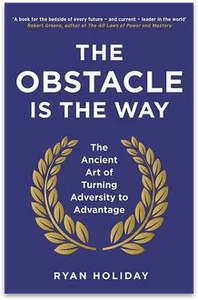
One strategy for overcoming obstacles is to expect them. Ryan Holliday’s book The Obstacle is the Way talks about this approach. I rated it #5 of my best books for 2016.
Download Book of the Year 2016 and 2017 here
It also has a special place in my library. It’s the first time ever I’ve read a book from cover to cover. Then, picked it up again and read it from cover to cover again. It was confronting and inspiring. This book draws on the Greek philosophy of enduring adversity with persistence called Stoicism. The challenge for me was that I have a lot of experience with coaching. And whilst I was trained in a lot of fancy techniques to have people take action, this one short-circuits all of them. All you really need is to ‘keep going.’ Buy this if you need a kick up the butt.
(Further, I originally read a copy of The Obstacle is the Way from the library (twice), then went out and bought a copy to keep in my library. Yes, it’s that valuable.)
It’s worth reminding us that often the best way to overcome our obstacles is to keep going.
What’s another word for Obstacle?
Sometimes we can get stuck using the word ‘obstacles’. I believe there can be significant value in reframing the words we use to describe what is happening or what has already happened. For instance:
- Is it a #$%?! disaster or merely a speed bump? Are our emotions exaggerating what is going on?
- Or the proverbial, are we making a mountain out of a molehill?
- Sometimes we confuse what’s in front of us: Is a problem really a catch-22 or merely complex with multiple moving parts?
- Is it really an obstacle or just part of what you’d expect? You might have heard the old saying about schoolteachers: ‘being a teacher would be fantastic if it wasn’t for the students.’
- Popular advice suggests we change the use of the word ‘problem’ to ‘challenge’. While this might work for you, I fear it has become tired, a cliché and often I see people use it to simply deflect the real issue to make us feel good (momentarily).
My preference as a synonym for obstacle is the word: breakdown. This usually makes us think of our car breaking down and not running anymore or someone experiencing a mental or emotional breakdown.
I use the term ‘breakdown’ very broadly: whenever something has not gone to plan. Which also means things can be a breakdown when they are incredibly good. For instance, if you won a billion dollars in the lottery this week – while a good problem to have, it is still a breakdown because you didn’t expect it and you now have a new set of decisions to make – What do I with all that money? Should I tell anyone? If I didn’t have to work for a living, how would I spend my time?
How to overcome your project management challenges
While there are oodles of things that can wrong in managing our projects, there is one process that I rely on and that you can use to deal with your breakdown.
I teach this in the Project Done Program because we always expect there will be breakdowns in our projects that we need to address. Plus it can be used quickly, easily and powerfully across your whole life.
Our use of the term ‘breakdown’ here comes from the field of Ontology – the study of being and existence.
The purpose of ‘declaring a breakdown’ is to give you choice about how you respond to situations and events you didn’t expect. It’s crucial to staying sane in our complex, topsy-turvy lives.
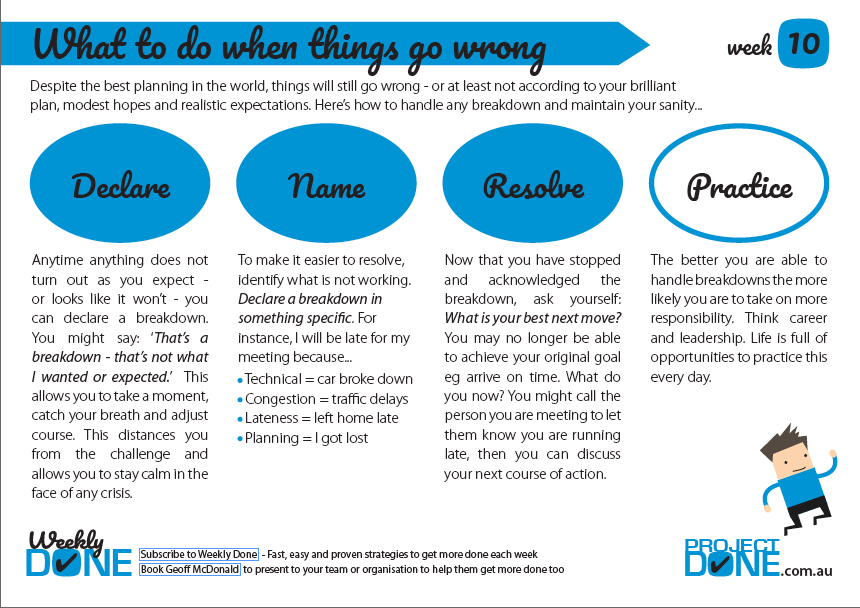
The Three Steps to Resolving a Breakdown
1 Declare
The first step to overcoming an obstacle is to notice the obstacle and declare that it is a breakdown.
This is a crucial step because when ever anything does not go according to our plans or meet our expectations we are instantly triggered to respond.
This might be as simple as, ‘I spilt the milk’ and as a result you start crying. Or, you stub your toe and want to yell in pain.
More likely, if it is a project management challenge we may want to blame the idiot that caused the problem.
While this is a natural response, we want to minimize the impact of this. If we can stay cool and calm in our response to the crisis our potential to lead remains intact. (Alternatively, you can instantly lose all of your hard-earned leadership credibility by throwing a tantrum.)
To minimize this emotional trigger whenever something does not turn out as you expected or looks like it won’t (don’t wait for it to happen – there is usually less mess to clean up if you defuse the bomb before it goes off) declare something along the lines of: ‘That’s a breakdown. This is not what I expected.’
Importantly, this gives us a moment to pause, catch your breath and adjust course.
You might like to think of this as drawing a line in the sand: ‘This has happened, I can’t change it (line in the sand) and now we’re going to make a fresh choice around what we’re going to do next.’
2 Name
The second step to overcoming an obstacle is to identify what is not working. This will make it easier to resolve it in Step 3.
We want to identify what specifically is not working, what specifically was unexpected or what isn’t going to plan.
In many cases, this will be fairly obvious. For instance, I will be late for my meeting because…
- Technical = car broke down
- Congestion = traffic delays
- Lateness = left home late
- Planning = I got lost
Many project management challenges will involve other people. In this situation, it is easy to name a person as the source of the breakdown but I’m not sure this will help a great deal. TIP: Look for system or environmental factors that might have prevented the situation from happening in the first place.
3 Resolve
The third step to overcoming an obstacle is to resolve it.
Now that you have stopped and acknowledged the breakdown, ask yourself: What is your best next move?
The whole point of this process is to stop driving down the road at full speed when you know the bridge ahead is out. That’s called ‘stupidity’. It’s much better to make another choice.
There are three likely scenarios here.
- The original goal is no longer possible, eg. You’re already late and are unable to arrive at a time that suits the other person.
- The original goal can be modified, eg. Call the person you are due to meet, tell them you cannot meet at 1pm, but you could make it by 1:15pm.
- The original goal is no longer desirable, eg. You will be one hour late for your meeting and the other person no longer wants to meet.
Once you clarify this, ask yourself: Given this situation, what is my best option?
Practice
While this might seem like a detailed process at first, the more you use it the easier and quicker you will complete it. And you don’t have to do this out loud or write it down. Often it can be a fast internal conversation like this:
“Oops. That’s a breakdown. I can no longer do that. I’ll do this instead.”
Summary: Overcome your Project Management Challenges
The big opportunity in developing your ability to overcome obstacles and project management challenges is that you will expand your willingness to take on bigger projects. And the bigger the projects you tackle, the bigger the opportunities to grow and expand your leadership, influence and career. Plus, life is full of opportunities to practice this every day.

